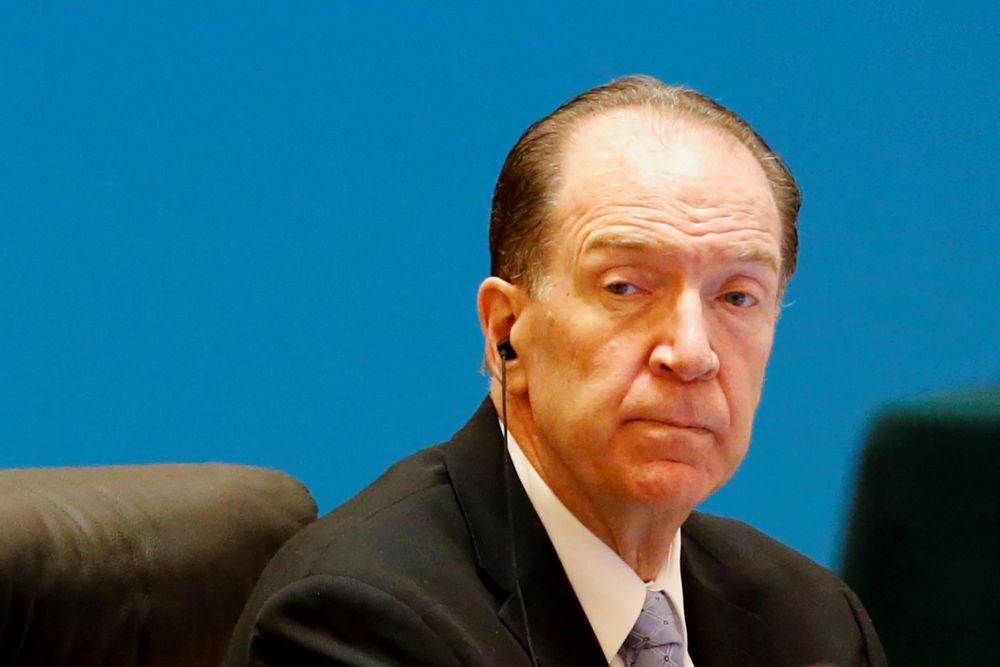BERLIN, Oct 5 — The Covid-19 pandemic could trigger a debt crisis in some countries, so investors must be ready for granting some form of relief that could also include debt cancellation, World Bank President David Malpass was quoted as saying yesterday.
“It is evident that some countries are unable to repay the debt they have taken on. We must therefore also reduce the debt level. This can be called debt relief or cancellation,” Malpass told Handelsblatt business daily in an interview.
“It is important that the amount of debt is reduced by restructuring,” Malpass added.
He pointed to similar steps in previous financial crises such as in Latin America and the so-called HIPC initiative for highly indebted countries in the 1990s.
Rich countries last month backed an extension of the G20’s Debt Service Suspension Initiative (DSSI), approved in April to help developing nations survive the coronavirus pandemic, which has seen 43 of a potential 73 eligible countries defer US$5 billion (RM20.8 billion) in “official sector” debt payments.
Amid warnings the pandemic could push 100 million people into extreme poverty, Malpass renewed his call for private banks and investment funds to get involved too.
“These investors are not doing enough and I am disappointed with them. Also, some of the major Chinese lenders did not get enough involved. The effect of the aid measures is therefore less than it could be,” the World Bank head said.
Malpass warned that the pandemic could trigger another debt crisis as some developing countries had already entered a downward spiral of weaker growth and financial trouble.
“The enormous budget deficits and debt payments are overwhelming these economies. In addition, the banks there are getting into difficulties due to bad loans,” Malpass added. (Reporting by Michael Nienaber; Editing by Peter Cooney)
Saudi business leader calls for boycott of goods from ‘hostile’ Turkey
RIYADH/ISTANBUL, Oct 4 (Reuters) — The head of Saudi Arabia’s Chambers of Commerce has called for a boycott of Turkish products amid reports from merchants that animosity between Ankara and Riyadh is hindering the flow of goods between the two regional powers.
Saudi Arabia and Turkey have been at odds for some years over foreign policy and attitudes towards political Islamist groups. The murder of Saudi journalist Jamal Khashoggi in Saudi’s Istanbul consulate in 2018 escalated tensions sharply.
Earlier this year the two countries blocked some of each other’s news websites.
“A boycott of everything Turkish, be it imports, investment or tourism, is the responsibility of every Saudi ‘trader and consumer’, in response to the continued hostility of the Turkish government against our leadership, country and citizens,” businessman Ajlan al-Ajlan tweeted on Saturday.
The Saudi Chambers of Commerce is a non-government group of private sector business people. The Saudi government’s communications office did not immediately respond to a request for comment.
For over a year, some Saudi and Turkish traders have speculated that Saudi Arabia was enacting an informal boycott of imports from Turkey.
A Saudi importer told Reuters on condition of anonymity that containers he imported this year from Turkey lay for three months with customs before being released. He said customs officials informally advised him not to import directly from Turkey again.
Turkish opposition lawmaker Mehmet Güzelmansur said last week that goods, in particular perishable fruit and vegetables, exported from his region of Hatay are held at the Saudi border for longer than necessary on arrival.
In comments reported in Turkish media and on his Twitter page, he said he was concerned that what he described as the partial, informal embargo by Saudi Arabia would be deepened.
On Thursday, Turkish President Tayyip Erdogan took a swipe at the Gulf Arab states in a speech to parliament.
“It should not be forgotten that the countries in question did not exist yesterday, and probably will not exist tomorrow. But we will continue to fly our flag in this geography forever with the permission of Allah,” Erdogan said.
Neither Turkish nor Saudi trade data show an unusually large drop in bilateral trade this year, taking into account the strains the coronavirus pandemic has placed on global commerce.
In the second quarter of this year, Turkey was Saudi Arabia’s 12th trade partner by total import value. In July — the latest available data — Saudi imports from Turkey were worth around US$185 million, up from roughly US$180 million in June. — Reuters






















